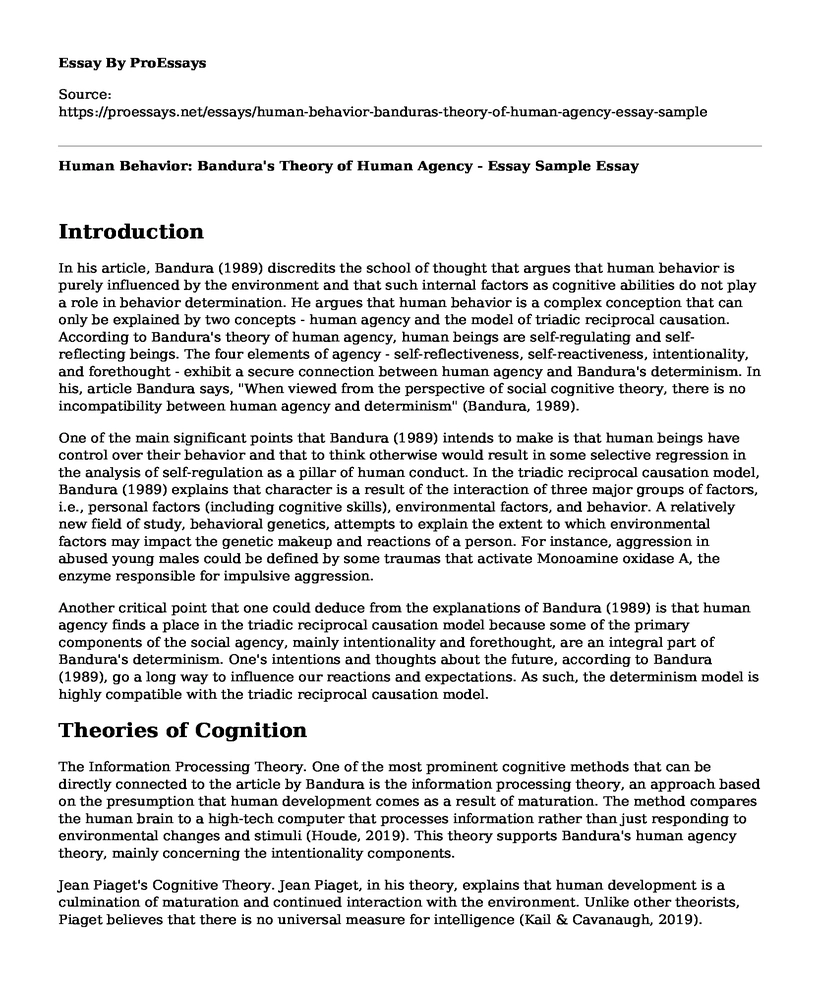Introduction
In his article, Bandura (1989) discredits the school of thought that argues that human behavior is purely influenced by the environment and that such internal factors as cognitive abilities do not play a role in behavior determination. He argues that human behavior is a complex conception that can only be explained by two concepts - human agency and the model of triadic reciprocal causation. According to Bandura's theory of human agency, human beings are self-regulating and self-reflecting beings. The four elements of agency - self-reflectiveness, self-reactiveness, intentionality, and forethought - exhibit a secure connection between human agency and Bandura's determinism. In his, article Bandura says, "When viewed from the perspective of social cognitive theory, there is no incompatibility between human agency and determinism" (Bandura, 1989).
One of the main significant points that Bandura (1989) intends to make is that human beings have control over their behavior and that to think otherwise would result in some selective regression in the analysis of self-regulation as a pillar of human conduct. In the triadic reciprocal causation model, Bandura (1989) explains that character is a result of the interaction of three major groups of factors, i.e., personal factors (including cognitive skills), environmental factors, and behavior. A relatively new field of study, behavioral genetics, attempts to explain the extent to which environmental factors may impact the genetic makeup and reactions of a person. For instance, aggression in abused young males could be defined by some traumas that activate Monoamine oxidase A, the enzyme responsible for impulsive aggression.
Another critical point that one could deduce from the explanations of Bandura (1989) is that human agency finds a place in the triadic reciprocal causation model because some of the primary components of the social agency, mainly intentionality and forethought, are an integral part of Bandura's determinism. One's intentions and thoughts about the future, according to Bandura (1989), go a long way to influence our reactions and expectations. As such, the determinism model is highly compatible with the triadic reciprocal causation model.
Theories of Cognition
The Information Processing Theory. One of the most prominent cognitive methods that can be directly connected to the article by Bandura is the information processing theory, an approach based on the presumption that human development comes as a result of maturation. The method compares the human brain to a high-tech computer that processes information rather than just responding to environmental changes and stimuli (Houde, 2019). This theory supports Bandura's human agency theory, mainly concerning the intentionality components.
Jean Piaget's Cognitive Theory. Jean Piaget, in his theory, explains that human development is a culmination of maturation and continued interaction with the environment. Unlike other theorists, Piaget believes that there is no universal measure for intelligence (Kail & Cavanaugh, 2019). Instead, he argues that the wrong answers given by children in tests that are designed to estimate logical intelligence portray the various ways of human thinking. It does not act as a measure of intelligence. This theory is also in line with the arguments of Bandura in the triadic reciprocal causation model because both of them recognize the role of both biological changes and environmental factors in behavior development.
Prefrontal Cortex
The prefrontal cortex plays a critical role in the determination of behavior because it is responsible for higher cognitivepurposles such as planning, memory, problem- solving, flexibility, attention, and decision making. Concerning the mind, it plays a critical function in the short ter memorym. A poorly functioning cortex may lead to impulsive behavior because the affected brain would not have the cognitive capacity to make decisions and engage in orderly proble- solving. Considering the complexity of the functions controlled by the prefrontal cortex, it is valid to conclude that it plays a critical role in behavior development in humans.
References
Bandura, A. (1989). Human agency in social cognitive theory. American psychologist, 44(9), 1175.
Houde, O. (2019). 3-system theory of the cognitive brain: A post-Piagetian approach to cognitive development. New York: Routledge
Kail, R. V., & Cavanaugh, J. C. (2019). Human development: A life-span view. Australia: Cengage
Cite this page
Human Behavior: Bandura's Theory of Human Agency - Essay Sample. (2023, Feb 26). Retrieved from https://proessays.net/essays/human-behavior-banduras-theory-of-human-agency-essay-sample
If you are the original author of this essay and no longer wish to have it published on the ProEssays website, please click below to request its removal:
- Employee Inspiration. Interpersonal Style. The Big Five Personality Test
- Memory Research Paper Example
- Paper Example on Organizational and Individual Stress Coping Strategies
- Dissociative Identity Disorder Essay Example
- Essay Sample on Person Centered Theory
- Essay Sample on Adequate Sample Size: Key to a Strong Research
- Essay Example on Anxiety Diagnosis: Features & History to Elicit







